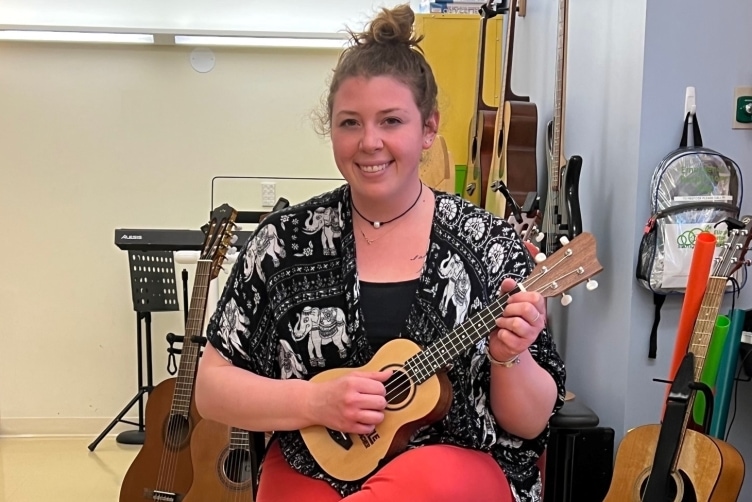The More we Get Together: Building Relationship through Ukulele Play
Elizabeth Ingram, MS, LCAT, MT-BC
Music Therapist
In my work as a music therapist, the therapeutic relationship is paramount. We are working with people and there is no way for there not to be a relationship! Currently I work in pediatric long-term care at Elizabeth Seton Children’s Center in Yonkers, NY, and have found the ukuleles donated by the Ukulele Kids Club to be an invaluable tool for connecting and building relationships in order to reach milestones and goals. Here are a few anecdotes of the ukulele and building relationships:
Parker
Parker* is a toddler with multiple medical complexities who has been living here for most of his life. I started working with him when he was just over a year old. Early in our sessions, Parker wanted to engage mostly through his feet and often gravitated towards toys as opposed to instruments. He is self-directed and loves to play. Around the time he was 3 years old, he was on an extended isolation due to treatments. A few weeks prior, I had first introduced the ukulele. He seemed to like it as shown through his playing, smiling, and reaching for the ukulele when it was put away. However, throughout his time in isolation, his relationship with the ukulele changed and so did our working relationship. Each time I visited and brought the ukulele, Parker continued to gravitate towards it more and more. He began to figure out how the strings work and soon our work musicing blossomed into social reciprocity through him taking my hand to play when his turn ended. I then would encourage him to continue to play and through this we developed a deeper working relationship. This goal of social reciprocity grew from parallel play to cooperative play. As Parker strummed the strings, I formed chords. At the end of playing “Twinkle Twinkle Little Star” for the first time, the whole way through, Parker let out a huge exclamatory yell and smiled brightly. This reaction continues as we work together now. Parker’s original goal of playing instruments alongside the ukulele quickly grew to parallel and then cooperative play. In terms of relationship-based music therapy, in the beginning, I wasn’t always sure how to best work with Parker However, through this process our therapeutic relationship grew into working together in the music. These interactions seemed to guide me into helping Parker establish and reach goals and seemed to help him trust in this space to explore and engage in new experiences. The ukulele was a new experience for him and he quickly connected to it. This new ukulele experience with me can be part of him connecting and trusting others in new experiences.
Matt
Matt* is an 8 year old with multiple medical complexities. He and I started working together almost 2 years ago and I have found our work together to be a journey. When we first started, Matt was in a crib and when I approached him to work and make music together, he pushed my hands away. Which made sense – who wants therapy in bed all the time? So we moved our sessions to the community area of his neighborhood. He seemed engaged sometimes but I still felt like I wasn’t’t providing the right space for him. On a whim, I brought a ukulele donated by the Ukulele Kids Club. Matt was immediately drawn to this instrument. I think guitar and piano are very important instruments in our clinical work but sometimes feel that their size, especially with small children, can be intimidating and physically too big for our clients who are little. Matt much like Parker quickly took to strumming the strings and also bringing my hands to play. Matt is a child who normally plays an instrument for a few moments at a time and then throws it to the side. With the ukulele, he plays for sometimes up to 10 minutes before being ready for the next intervention. While I felt disconnection in our therapeutic relationship originally, we now have a true field of play. Field of play is a concept created by music therapist, Carolyn Kenny, and it focuses on the relationship between therapist, client, and music. Our sessions are now are truly a field of play, about the music, Matt and the relationship we have built. This strong relationship was demonstrated after a long hospitalization, Matt came back and immediately connected to myself and the ukulele again through bright smiles and a readiness to begin to engage in play.
In these stories, similar to many more at Elizabeth Seton Children’s Center, the ukuleles donated by the Ukulele Kids Club have helped to create beautiful spaces for connection and relationship building. What is it about the ukulele? Is it the small size that creates physical space for connection? Is it the ability to co-create music as one plays the strings and one plays the chords? Is it the sound? I think the answer could be any, all, and more, and I cannot wait to see where it takes us next.
–
*All names have been changed to protect patient privacy












